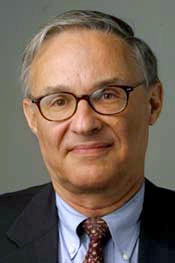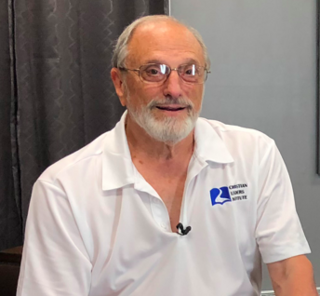Related Research Articles
Utilitarian bioethics refers to the branch of bioethics that incorporates principles of utilitarianism to directing practices and resources where they will have the most usefulness and highest likelihood to produce happiness, in regards to medicine, health, and medical or biological research.

Arthur L. Caplan is the Drs. William F. and Virginia Connolly Mitty Professor of Bioethics at New York University Grossman School of Medicine and the founding director of the Division of Medical Ethics.

Leon Richard Kass is an American physician, scientist, educator, and public intellectual. Kass is best known as a proponent of liberal education via the "Great Books," as a critic of human cloning, life extension, euthanasia and embryo research, and for his tenure as chairman of the President's Council on Bioethics from 2001 to 2005. Although Kass is often referred to as a bioethicist, he eschews the term and refers to himself as "an old-fashioned humanist. A humanist is concerned broadly with all aspects of human life, not just the ethical."

Roy A. Clouser is professor emeritus of the College of New Jersey. He has served as professor of philosophy, religion, and logic at the college since 1968. He serves as the resident philosopher of Christian Leaders Institute.

Amy Gutmann is an American academic and diplomat who is the United States Ambassador to Germany. She was the eighth president of the University of Pennsylvania. In November 2016, the school announced that her contract had been extended to 2022, which made her the longest-serving president in the history of the University of Pennsylvania. Gutmann resigned from her role as president on February 8, 2022, following her confirmation by the Senate as ambassador, after 18 years at the University.
James Franklin Childress is a philosopher and theologian whose scholarship addresses ethics, particularly biomedical ethics. Currently he is the John Allen Hollingsworth Professor of Ethics at the Department of Religious Studies at the University of Virginia and teaches public Policy at the Frank Batten School of Leadership and Public Policy. He is also Professor of Medical Education at this university and directs its Institute for Practical Ethics and Public Life. He holds a B.A. from Guilford College, a B.D. from Yale Divinity School, and an M.A. and Ph.D. from Yale University. He was vice-chairman of the national Task Force on Organ Transplantation, and he has also served on the Board of Directors of the United Network for Organ Sharing (UNOS), the UNOS Ethics Committee, the Recombinant DNA Advisory Committee, the Human Gene Therapy Subcommittee, the Biomedical Ethics Advisory Committee, and several Data and Safety Monitoring Boards for NIH clinical trials. From 1996 to 2001, he served on the presidentially-appointed National Bioethics Advisory Commission. He is a fellow of the Hastings Center, an independent bioethics research institution.
Matthew K. Wynia is an American physician and bioethicist who has been the director of the Center for Bioethics and Humanities at the University of Colorado's Anschutz Medical Campus since 2015. He also oversees an art gallery and forum there. He previously directed the American Medical Association's Institute on Ethics for 15 years. He also previously served as an assistant professor of medicine at the University of Chicago, as the president of the American Society for Bioethics and Humanities, and as the director of patient and physician engagement at the American Medical Association in Chicago.
Mary Anne Warren was an American writer and philosophy professor, noted for her writings on the issue of abortion and animal rights.
Mark Kuczewski is an American philosopher and bioethicist who has been a key contributor to the New Professionalism movement in medicine and medical education. In general, interest in professionalism has been widespread in medicine probably owing to the increasing regulatory and economic pressures on the practice of medicine. Many physicians have sought to identify the focal meaning of what it is to be a doctor in an effort to revitalize the profession. Kuczewski has been among a group that includes Richard and Sylvia Creuss, John Coulehan, and Matthew Wynia who see medical professionalism as including a commitment to social justice. That is, while professionalism entails such things as etiquette, communication skills, and basic medical ethics, professions are also expected to be leaders in educating the public and in advocating for the health of the public. Such leadership requires an understanding of the factors that lead some patient populations to be underserved and a commitment to bringing about social change to ameliorate these problems. The New Professionalism movement in medicine is a revival of communitarian bioethics that focus on the kinds of people and society we wish to be rather than on particular ethical questions of right and wrong. This focus on the relationship between the professional and the community can have important implications for medical education and professional development. While not eschewing case analysis and problem solving, the emphasis on the development of the person has created a renewed interest in narrative methods and reflection. Kuczewski has been an outspoken critic of efforts in medical education to focus on quantitative measures of professionalism education. He has argued that in an effort to make professionalism education “objective,” many medical educators are equating professionalism with trivial but easily measured behaviors. Kuczewski’s interest in professionalism and social justice has led him to pursue ethical issues in the interactions between medicine and recent immigrant populations. He has brought his work in communitarian and casuistic methods to bear on questions such as medical repatriation, insurance for undocumented immigrants, and the eligibility of DREAMers to become practicing physicians. His scholarship and advocacy was the catalyst for the Loyola University Chicago Stritch School of Medicine becoming the first medical school in the United States to explicitly welcome applications from DREAMers with Deferred Action for Childhood Arrivals (DACA) status. Under Kuczewski’s direction, the Neiswanger Institute for Bioethics and Health Policy at Loyola University Chicago has become a leader in educational programming to promote the relationship between medical professionalism and social justice. The Neiswanger Institute has contributed elements to the Stritch curriculum that explore the relationship between the business of medicine and social justice. The Institute also has online master of arts and doctoral programs that incorporating public health and leadership training in order to help health care professionals across the United States to promote service to the underserved. Kuczewski was elected president of the American Society for Bioethics and Humanities and served a two-year term from 2009 to 2011. The ASBH is the major professional association in the United States for individuals engaged in bioethics and medical humanities. During his term, the society aggressively began moving toward a process called Quality Attestation that will attest to the credentials and expected competence of clinical ethics consultants.

Principlism is an applied ethics approach to the examination of moral dilemmas that is based upon the application of certain ethical principles. This approach to ethical decision-making has been adopted enthusiastically in many different professional fields, largely because it sidesteps complex debates in moral philosophy at the theoretical level.
Jonathan D. Moreno is an American philosopher and historian who specializes in the intersection of bioethics, culture, science, and national security, and has published seminal works on the history, sociology and politics of biology and medicine. He is an elected member of the National Academy of Medicine.
Tom Lamar Beauchamp is an American philosopher specializing in the work of David Hume, moral philosophy, bioethics, and animal ethics. He is Professor Emeritus of Philosophy at Georgetown University, where he was Senior Research Scholar at the Kennedy Institute of Ethics.
Dan W. Brock was an American philosopher, bioethicist, and professor emeritus at Harvard University and Brown University. He was the Frances Glessner Lee Professor Emeritus of Medical Ethics in the Department of Global Health and Social Medicine at Harvard Medical School, the former Director of the Division of Medical Ethics at the Harvard Medical School, and former Director of the Harvard University Program in Ethics and Health (PEH). He held the Tillinghast Professorship at Brown University and served as a member of the Department of Clinical Bioethics at the National Institutes of Health. Brock earned his B.A. in economics from Cornell University and his Ph.D. in philosophy from Columbia University.
Stephen Garrard Post has served on the Board of the John Templeton Foundation (2008-2014), which focuses on virtue and public life. He is a researcher, opinion leader, medical school professor, and best-selling author who has taught at the University of Chicago Medical School, Fordham University-Marymount, Case Western Reserve University School of Medicine (1988-2008) and Stony Brook University School of Medicine (2008-). He is widely known for his research on the ways in which giving can enhance the health and happiness of the giver, how empathy and compassionate care contribute to patient outcomes, ethical issues in caring for people with dementia, medical professionalism and the virtues, and positive psychology in relation to health and well-being. Post is an elected member of the College of Physicians of Philadelphia, the New York Academy of Medicine, and the Royal Society of Medicine, London. He was selected nationally as the Public Member of the United States Medical Licensing Examination (USMLE) Composite Committee (2000-2005), and was reappointed for outstanding contributions.
Robert John Fogelin was an American philosopher, and advocate and leading scholar of modern Pyrrhonism. He was a professor of philosophy and Sherman Fairchild Professor in the humanities (emeritus) at Dartmouth College where he had taught since 1980. He was elected a fellow of the American Academy of Arts and Sciences in 2005.
Leonard Michael Fleck is an American philosophy professor and medical ethicist. He earned his Ph.D. from St. Louis University in 1975 and taught courses at St. Mary's College (Indiana) before going on to teach and at Michigan State University where he currently holds a dual appointment with the philosophy department and the Center for Ethics and Humanities in the Life Sciences. Fleck was also a member of Hillary Clinton's Task Force on Health Reform in 1993 and the staff ethicist for the Michigan governor's task force on access to health care in 1989-1990.
Ron Polansky is an American philosopher and educator. A Professor of Philosophy at Duquesne University, he edits the journal Ancient Philosophy. He also edits Mathesis Publications. Polansky teaches and works widely in ancient philosophy, but also has worked and taught bioethics and early modern political philosophy. He is married to Susan Polansky who teaches at Carnegie Mellon University.
David DeGrazia is an American moral philosopher specializing in bioethics and animal ethics. He is Professor of Philosophy at George Washington University, where he has taught since 1989, and the author or editor of several books on ethics, including Taking Animals Seriously: Mental Life and Moral Status (1996), Human Identity and Bioethics (2005), and Creation Ethics: Reproduction, Genetics, and Quality of Life (2012).
Joan Callahan was a Professor Emerita of Philosophy at the University of Kentucky, an institution where she taught for more than twenty years and served in a variety of roles, including as director of the Gender and Women's Studies Program. Callahan's research has focused on feminist theory, critical race theory, ethics, social and political philosophy, the philosophy of law, and on the junctions of these topics.

Charles Culver was a medical ethicist and a psychiatrist. He was primarily known for his work in medical ethics and his contributions in founding the field of bioethics in the United States.
References
- ↑ In Memoriam, Kennedy Institute of Ethics Journal, Volume 10, Number 4, December 2000, pp. vii-viii | 10.1353/ken.2000.0029